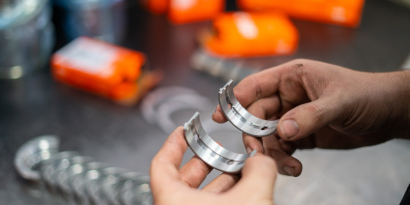Anyone who follows us on the RIO blog knows that bearings are critical components for the proper functioning of a vehicle, as we explain here. After all, they act as a kind of cushion between the connecting rods and the crankshaft, ensuring that these moving parts of the engine operate more smoothly. And it is for this same reason that bearing problems and failures are often so worrisome!
Therefore, detecting bearing problems when they are still in their early stages is critical to avoid more serious damage to the engine and, of course, avoid an extremely costly repair. But don’t worry: in this article we will explore some of the signs that indicate bearing failures, helping you, my Expert friend, to diagnose and fix them in time. Stay with us!
5 important signs of bearing failures
Bearings are small parts made from different materials and special alloys whose main function is to support and reduce friction between a moving part and a static part of the engine. Hence, when they stop working, these parts begin to rub against each other, which can cause deformities, breakages and overheating of these components. So, before the whole thing gets out of control, it’s important to pay attention to the early signs of bearing failure, such as:
1 – Engine knocking noises
Knocking noises, often described as “metallic knocks” or “clicks,” are a classic sign of bearing issues. This occurs because these parts, when worn out, are no longer able to keep the connecting rods firmly connected to the crankshaft, which leads to excessive friction between the parts, resulting in noise. If you hear these sounds coming from the engine, it is a serious indication that the bearings need to be checked and possibly replaced.
2 – Low engine pressure
More than reducing friction, bearings also play a critical role in sealing the oil passage areas in the engine. So, when they are worn out or damaged, oil leaks can occur, generating a drop in the overall pressure, which is monitored by the pressure indicator on the vehicle’s dashboard. A reading below normal may indicate bearing failure.
3 – Compromised performance
Before creating catastrophic problems and defects, bearing failures tend to gradually affect the vehicle’s performance. You may notice power loss, difficulty accelerating and slow responses to pedal handling. This occurs because the additional friction in the bearings makes it difficult for the connecting rods to move smoothly, impairing the overall functioning of the engine.
4 – Engine shaking
When these parts are defective, the driver may notice abnormal vibrations in the engine — especially on the steering wheel and dashboard, which makes driving uncomfortable. All this trepidation is caused by excessive friction in the bearings, which results in irregular movements of the connecting rods and crankshaft. Therefore, if your customer reports unusual vibrations while driving, it is important to investigate bearing failures as a possible cause.
5 – Increased engine temperature
As we explained at the beginning of the article, bearing failures cause engine parts to rub against each other, which can lead to an increase in the vehicle’s temperature, as the heat generated by friction is not effectively dissipated. At this point it is worth paying extra attention, since overheating is a serious problem that can cause irreparable damage, making early identification of bearing problems critical.
When it is time for maintenance, demand quality bearings!
Well, you may have noticed that identifying bearing failures in advance is paramount to avoid major headaches, right? But don’t forget that this is just the first step! To ensure that your customers’ vehicles continue to function consistently and for much longer, you should not refrain from using quality bearings during maintenance or repairs. After all, choosing low-quality bearings can lead to recurring problems and, eventually, catastrophic engine failures.
And this is where RIO comes in as a reliable supplier, with tradition and unique quality combined in a complete catalog of high-efficiency bearings. In other words, you have connecting rod bearings, rolling bearings and thrust washers produced with the best and safest precision engineering, ensuring a correct application and an even more satisfied customer! Still have questions? Then take a look at the special video we prepared to talk about this powerful launch by RIO:
Count on us! Visit our website and check out a portfolio with over 5 thousand items for cars, motorcycles and trucks from practically all manufacturers and models — all with the orange RIO warranty that you already know! We hope this article helps you on a daily basis. If you have any questions left, talk to us here in the comments!





